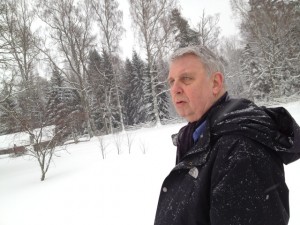 Ranulph Glanville is a British freelance researcher and theoretician in both architecture and cybernetics. He studied architecture at the Architectural Association from 1964 to 1971. He completed a PhD in cybernetics at Brunel University in 1975, and obtained a second PhD in Human Learning from Brunei in 1988. He worked briefly as an architect in UK and Finland. He taught at the Architectural Association 1972–78, and Portsmouth Polytechnic 1978-97. He was Adjunct Professor at the Royal Melbourne Institute of Technology 1998–2001. He has been a freelance researcher since 1997, and lives in Portsmouth, UK. He has had scientific papers published in the fields of architecture, cybernetics and psychology. He is a regular contributor to conferences around the world.
Ranulph Glanville is a British freelance researcher and theoretician in both architecture and cybernetics. He studied architecture at the Architectural Association from 1964 to 1971. He completed a PhD in cybernetics at Brunel University in 1975, and obtained a second PhD in Human Learning from Brunei in 1988. He worked briefly as an architect in UK and Finland. He taught at the Architectural Association 1972–78, and Portsmouth Polytechnic 1978-97. He was Adjunct Professor at the Royal Melbourne Institute of Technology 1998–2001. He has been a freelance researcher since 1997, and lives in Portsmouth, UK. He has had scientific papers published in the fields of architecture, cybernetics and psychology. He is a regular contributor to conferences around the world.
Glanville has written more than 170 articles and papers about both architecture and cybernetics.
He is a Fellow of the Cybernetics Society and currently the President of the American Society for Cybernetics.
1. Can you briefly describe your field of research?
I carry out research in a number of areas, including how to do research, designing, and cybernetics. My cybernetic research encompasses my other research areas. It might be described as research intended to create structures that provide greater freedom for individual actions. Sometimes this means my freedom to act.
2. What fascinates you about cybernetics/systems research/system theory?
The transcendental beauty of cybernetics.
3. Where do you see or would like to see the field heading? What changes would you like to see?
We should be less easily satisfied with the arbitrary.
We should read the “giants” looking for ways forward, not to treat them as gurus.
We should look for and support those to pass the baton to.
4. What impact does your field of research have on society? What practical application for society does it have? Do you see practical applications in your own life? Can you give examples?
I am reminded of Claes Oldenberg’s comment when he was asked what influence history had on his art. He replied: “influence, on me! I influence history.” Of course, this question is the other way round, but it is only in the future that the effective influence of the work of any of us will be determinable.
As for practical application: application is not a good word for a cybernetic system since it implies superiority of that applied. There is a relationship between research and practice, which is one of the things I research (and practise). Through this, I learn to live a more cybernetic life. This is more difficult that making new ideas all the time.
Most of all, I would like cybernetics to be valued for its beauty, not for its utility. It is time we stopped admiring utility: it leads to the material culture we live in.
5. What’s a scholar/writer, whose work inspires you in your own work?
Most of all, my professor Gordon Pask.
Please answer the three questions regarding your responsibility with one of the influencing organizations within the systems movement.
1. What does the American Society for Cybernetics mean to you?
The ASC (www.asc-cybernetics.org) is a home of a sort, for a range of ideas, for exploration. It has the possibility of moving us forward.
2. Why should other people show interest in the American Society for Cybernetics? What will they experience or learn?
The ASC is the most lively cybernetic society I know, the only one to have taken seriously Mead’s request that a cybernetic society should behave in a cybernetic manner. We hold conferences in many forms, which value conversation, listening and the development of ideas together, and the next questions; as well as generating outstanding online records (see www.asc-cybernetics.org/2010, and www.asc-cybernetics.org/2011). We are working on multi-authored sources of cybernetic understanding. We initiate collaborations with other cybernetic and systems societies (see the website for our 2012 conference, www.asc-cybernetics.org/2012). We are publishing.
We are moving to recognise the upcoming generation and to understand and clarify the key concepts of (second order) cybernetics.
We are exciting and excited.
3. What is your current position or responsibility with the American Society for Cybernetics?
I am the president of the American Society for Cybernetics



